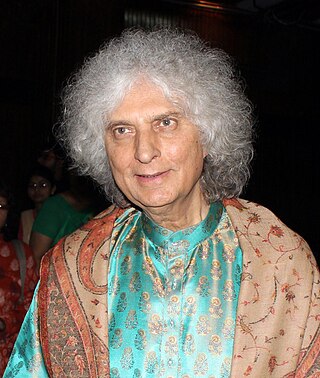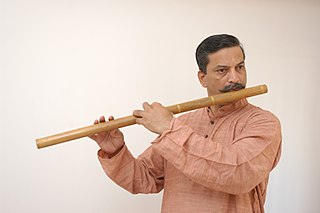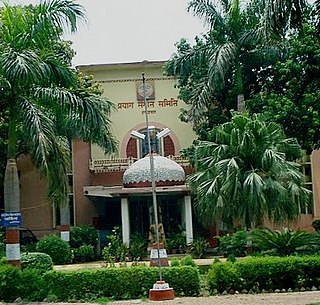Related Research Articles

Hariprasad Chaurasia is an Indian music director and classical flautist, who plays the bansuri, in the Hindustani classical tradition.

Shivkumar Sharma was an Indian classical musician and santoor player who is credited with adapting the santoor for Indian classical music. As a music composer, he collaborated with Indian flautist Hariprasad Chaurasia under the collaborative name Shiv–Hari and composed music for such hit Indian films as Faasle (1985), Chandni (1989), and Lamhe (1991).

Natesan Ramani, commonly known as N. Ramani or N. Flute Ramani, was an Indian Carnatic flautist. He was awarded the Madras Music Academy's Sangeetha Kalanidhi in 1996. Ramani is also credited with introducing the long flute into Carnatic music.

Pandit Bhajan Sopori was an Indian instrumentalist. He was a player of the santoor, an ancient stringed musical instrument.

Ronu Majumdar is an Indian flautist in the Hindustani classical music tradition.

Pravin Godkhindi is an Indian classical Hindustani flute (bansuri) player. He has mastered both the tantrakari and gayaki style of playing on the flute. He was called a top ranking artist in Hindustani bansuri, by Akashvani (AIR).
Ustad Ahmed Jan Khan "Thirakwa" was an Indian tabla player, commonly considered the pre-eminent soloist among tabla players of the 20th century, and among the most influential percussionists in the history of Indian Classical Music.

Nityanand Haldipur is a performer and teacher of the Indian bamboo flute, known in India as the bansuri. He is a purist in the true Maihar Gharana tradition and learned from Ma Annapurna Devi, in Mumbai, India. He has been rated as a "Top Grade" artist by the All India Radio and was awarded the prestigious Sangeet Natak Academi award in 2010.
Chetan Joshi is a noted flautist in the Hindustani classical music tradition. He was born in Jharia and brought up at Noamundi and Bokaro Steel City. He was trained under Late Acharya Jagadish (Bokaro), Late Pandit Bholanath Prasanna (Allahabad), Late Pandit Raghunath Seth (Mumbai) and Pandit Ajoy Chakravorty (Kolkata).

Prayag Sangeet Samiti is an institute imparting education in Hindustani Classical music, in Prayagraj, India. It awards diplomas and certificates in vocal music, instrumental music as well as classical dance. It was established in 1926. This institution is registered under the Indian Societies Act. The major aim of this organization is to propagate various vocal and instrumental music streams that are widely recognized by state governments, universities and educational bodies. In 2007, it started awarding degrees and diplomas in Minor Subjects also. The Institute is mainly concentrated in North India and has produced a number of prominent artists from the states of Uttar Pradesh, Uttarakhand, Himachal Pradesh, Jammu and Kashmir, Punjab, Haryana, Delhi, Rajasthan, Gujarat, Bihar, West Bengal and other north-eastern states.
Pandit Raghunath Seth was a noted Indian exponent of Hindustani classical music through the medium of Bansuri, or bamboo flute; he was also a noted film score composer. He has received Sangeet Natak Akademi Award in 1994, given by Sangeet Natak Akademi, India's National Academy for Music, Dance and Drama.
Deepak Ram is a South African born flautist, composer, keyboard player and producer of Indian origin. Deepak is considered a master of bansuri, an Indian flute of ancient origin made from bamboo. He is a senior disciple of world renowned bansuri maestro Pandit Hariprasad Chaurasia under whom he studied Indian classical music. Deepak's versatile playing and breadth of musical repertoire melds classical and improvisational techniques of Indian Raga, Jazz, Blues and Flamenco into a fusion that has garnered critical acclaim internationally. Deepak was awarded a SAMA in 2000 for 'Best Instrumental Album', Searching for Satyam. He has contributed on Shango and Labyrinth albums by the trance group Juno Reactor which was featured as the title soundtrack for The Matrix - Revolutions, Dead Bees on a Cake album by Jazz artist David Sylvian among others.

Pandit Raghunath Prasanna was an Indian classical shehnai and flute player. He was known for using the techniques of shehnai in flute playing inspired by vocal music.

Kamala Bose (Bengali) (1947–2012) was a prominent Indian classical vocalist.
Anant Lal, often referred to by the title Pandit, was an Indian classical musician who played the shehnai. He worked for All India Radio and played with artists such as Ravi Shankar and Debu Chaudhuri in addition to recording under his own name. Lal was one of the leading exponents of the shehnai in Hindustani classical music. In 1989, he received the Sangeet Natak Akademi Award, the highest recognition afforded artists in India.

Pandit Niranjan Prasad was an Indian flutist. He belonged to Allahabad.
Rajat Prasanna is an Indian Classical Flautist from the Beneres Gharana. He is the grandson of the late Pandit Raghunath Prasanna and the nephew of the late Pandit Bholanath Prasanna.
Gurukul Pratishthan, a charitable trust, is an institute with the ideology of promoting and encouraging the Indian classical music and various other forms of art. It was founded by Shree Vivek Sonar. He is one amongst the senior most deciples of Pandit Hariprasad Chaurasia, a Padma Vibhushan holder and a well-known artist of the instrument Bansuri.

Sameer Rao is an Indian flautist who plays the Bansuri, the Indian bamboo flute. He is one of the prominent disciple of Pandit Hariprasad Chaurasia.

Sunder Lal Gandharv is an Indian flautist known for his contributions to Hindustani classical music. He has earned various honors.
References
- 1 2 3 4 5 6 7 "Blowing in the wind". Indian Express. 5 February 2014. Retrieved 13 January 2016.
- 1 2 3 4 5 6 Chittorgarh, Manik (6 April 2013). "Flute Sisiters[sic] Suchismita & Debopriya". Mumbai, India: Apni Maati. Retrieved 15 February 2016.
- 1 2 3 "Flute flight". Tribune India Magazine. 26 October 2013. Retrieved 13 January 2016.
- 1 2 3 "Flute Sisters". The Daily Star. New Delhi, India. 14 March 2011. Retrieved 15 February 2016.
- 1 2 "Chatterjee sisters' flute performances from today". New Delhi: The Daily Pioneer. 17 September 2013. Retrieved 15 February 2016.
- ↑ "Flute sisters enthrall students at Queens' college". The Times of India. Mombai, India. 26 July 2013. Retrieved 15 February 2016.
- ↑ "Debopriya Chatterjee: Hindustani Instrumental – Flute". Sangeey Natak Academy, Government of India. 2008. Archived from the original on 2 October 2015. Retrieved 13 January 2016.